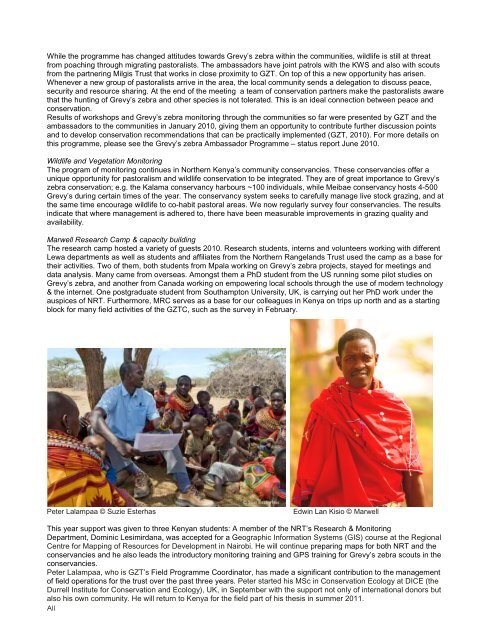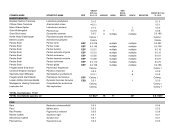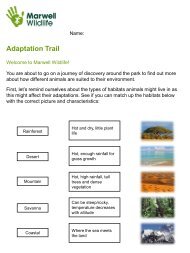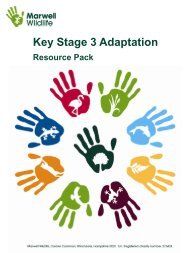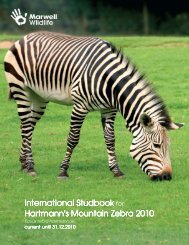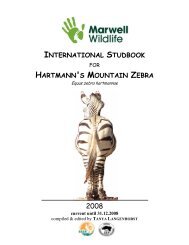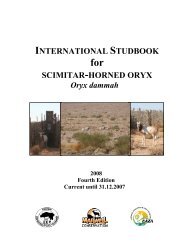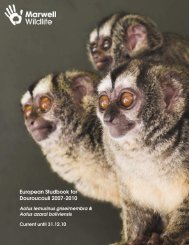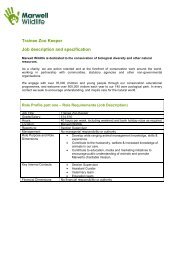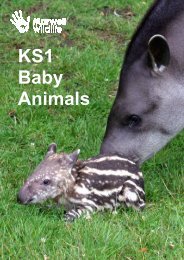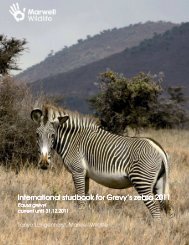International International studbook for Grevy's zebra ... - Marwell Zoo
International International studbook for Grevy's zebra ... - Marwell Zoo
International International studbook for Grevy's zebra ... - Marwell Zoo
Create successful ePaper yourself
Turn your PDF publications into a flip-book with our unique Google optimized e-Paper software.
While the programme has changed attitudes towards Grevy’s <strong>zebra</strong> within the communities, wildlife is still at threat<br />
from poaching through migrating pastoralists. The ambassadors have joint patrols with the KWS and also with scouts<br />
from the partnering Milgis Trust that works in close proximity to GZT. On top of this a new opportunity has arisen.<br />
Whenever a new group of pastoralists arrive in the area, the local community sends a delegation to discuss peace,<br />
security and resource sharing. At the end of the meeting a team of conservation partners make the pastoralists aware<br />
that the hunting of Grevy’s <strong>zebra</strong> and other species is not tolerated. This is an ideal connection between peace and<br />
conservation.<br />
Results of workshops and Grevy’s <strong>zebra</strong> monitoring through the communities so far were presented by GZT and the<br />
ambassadors to the communities in January 2010, giving them an opportunity to contribute further discussion points<br />
and to develop conservation recommendations that can be practically implemented (GZT, 2010). For more details on<br />
this programme, please see the Grevy’s <strong>zebra</strong> Ambassador Programme – status report June 2010.<br />
Wildlife and Vegetation Monitoring<br />
The program of monitoring continues in Northern Kenya’s community conservancies. These conservancies offer a<br />
unique opportunity <strong>for</strong> pastoralism and wildlife conservation to be integrated. They are of great importance to Grevy’s<br />
<strong>zebra</strong> conservation; e.g. the Kalama conservancy harbours ~100 individuals, while Meibae conservancy hosts 4-500<br />
Grevy’s during certain times of the year. The conservancy system seeks to carefully manage live stock grazing, and at<br />
the same time encourage wildlife to co-habit pastoral areas. We now regularly survey four conservancies. The results<br />
indicate that where management is adhered to, there have been measurable improvements in grazing quality and<br />
availability.<br />
<strong>Marwell</strong> Research Camp & capacity building<br />
The research camp hosted a variety of guests 2010. Research students, interns and volunteers working with different<br />
Lewa departments as well as students and affiliates from the Northern Rangelands Trust used the camp as a base <strong>for</strong><br />
their activities. Two of them, both students from Mpala working on Grevy’s <strong>zebra</strong> projects, stayed <strong>for</strong> meetings and<br />
data analysis. Many came from overseas. Amongst them a PhD student from the US running some pilot studies on<br />
Grevy’s <strong>zebra</strong>, and another from Canada working on empowering local schools through the use of modern technology<br />
& the internet. One postgraduate student from Southampton University, UK, is carrying out her PhD work under the<br />
auspices of NRT. Furthermore, MRC serves as a base <strong>for</strong> our colleagues in Kenya on trips up north and as a starting<br />
block <strong>for</strong> many field activities of the GZTC, such as the survey in February.<br />
Peter Lalampaa © Suzie Esterhas Edwin Lan Kisio © <strong>Marwell</strong><br />
This year support was given to three Kenyan students: A member of the NRT’s Research & Monitoring<br />
Department, Dominic Lesimirdana, was accepted <strong>for</strong> a Geographic In<strong>for</strong>mation Systems (GIS) course at the Regional<br />
Centre <strong>for</strong> Mapping of Resources <strong>for</strong> Development in Nairobi. He will continue preparing maps <strong>for</strong> both NRT and the<br />
conservancies and he also leads the introductory monitoring training and GPS training <strong>for</strong> Grevy’s <strong>zebra</strong> scouts in the<br />
conservancies.<br />
Peter Lalampaa, who is GZT’s Field Programme Coordinator, has made a significant contribution to the management<br />
of field operations <strong>for</strong> the trust over the past three years. Peter started his MSc in Conservation Ecology at DICE (the<br />
Durrell Institute <strong>for</strong> Conservation and Ecology), UK, in September with the support not only of international donors but<br />
also his own community. He will return to Kenya <strong>for</strong> the field part of his thesis in summer 2011.<br />
AII


